Ask a question from expert
NURBN2000: Transition Into Nursing Studies
29 Pages4062 Words102 Views
Added on 2021-05-31
NURBN2000: Transition Into Nursing Studies
Added on 2021-05-31
BookmarkShareRelated Documents
Student Name:Student Number:CRICOS Provider Number 00103DIntroductionIn Assessment Task 2 –Part B you are required to complete a comprehensive health assessment and nursing care plan on information given to you in the casestudy- Mr. Kevin Jones. The case study information is located in the Book – Case Study Guidelines for Assessment Task 2 (B).Using the information gathered from the case study of Mr. Kevin Jones, you are expected to document the assessment you have undertaken. You are also asked to identify four (4) priority issues, develop, implement and evaluate your nursing care plan for Mr. Kevin Jones.All information is to be recorded in this Health Assessment & Nursing Care Plan Workbook. Your completed Health Assessment & Nursing Care Plan Workbook will be assessed using the marking guide in the NURBN2000 Moodle shell. Print a copy of the marking guide and keep it with you while writing your Care Plan to ensure you answer the questions correctly.School of Nursing, Midwifery and Healthcare Faculty of Health Bachelor of NursingNURBN2000Transition to Nursing Studies Semester 1, 2018Assessment 2 Part BHealth Assessment & Nursing Care Plan Workbook
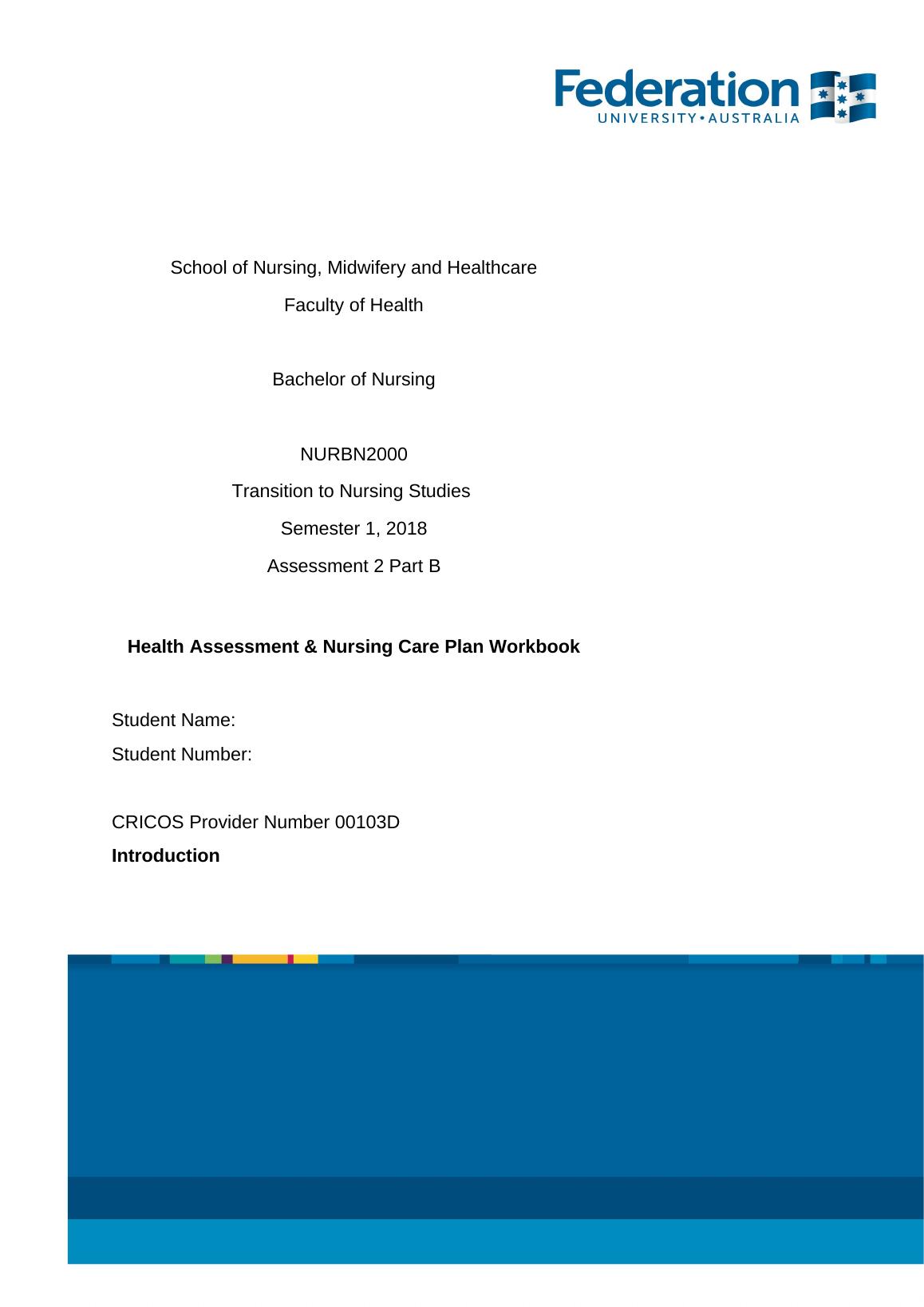
Guidelines for Health Assessment and Nursing Care plan (Total: 2000 words)This assessment relies on students being familiar with the nursing process as you will be required to follow the steps outlined in this process. If you are not familiar with this, review in any recommended nursing textbook – however, this has been covered in your prior EN training.Complete the workbook, ensuring you have answered all the questionsStudents will demonstrate clinical decision making skills in:1.The Nursing Process.2.Identification/ assessmentof nursing problems (nursing diagnosis)3.Planning and Implementation of nursing care4.Documentation of nursing data.5.Evaluation of nursing care Read this plan for the assessment task:Activity-Assessment Task 2: Total 2000 words600 word assessmentNursing Care Plan3 Diagnosis/ProblemsExpected outcomesInterventions Referenced 600 word assessment identifying physical & mental health components e.g. dehydration may result in anxiety & confusion (Gulanick & Myers, 2012)Remaining word count utilised in the rest of document (1400 words)Your care planning will be based on your assessment dataDevelop a Care Plan based on data gathered in your assessment (a,b,c). Then, identify three (3) main nursing problems and provide goals, interventions, rationale and implementation of that care.

RationaleEvaluationEvaluate (how successful was the care for each of the 3 problems identified)Submit WorkbookAdult Health Assessment – Total: 2000 wordsOutline: 1.Students are required to discuss the physical and mental health components for the assessment (600 words). This will need to be written & referenced according to academic writing & referencing standards.2.Identify 4 major issues for Kevin Jones, his social history and provide a summary of your overall assessment of him. Ensure that you use ‘objective’ language. This would be similar to what you would write in nursing notes as an admission history.3.Using the Nursing diagnosis section, select the three (3) health nursing diagnosis that you think are a priority for Kevin and include the evidence fromyour assessment that supports this. 4.Now prioritise these 3 important nursing problems to formulate a nursing care plan for Kevin5.Develop a nursing care plan with rationale (referenced) and related interventions that could be implemented for Kevin. 6.Complete the evaluation sections of the care plan - identify ways that you could measure success in relation to each of these interventions.1.Write your 600 word referenced assessment below discussing the physicaland mental health components for Kevin. This will need to be written according to academic writing & referencing standards.(NB: your assessment will roll into the next page).
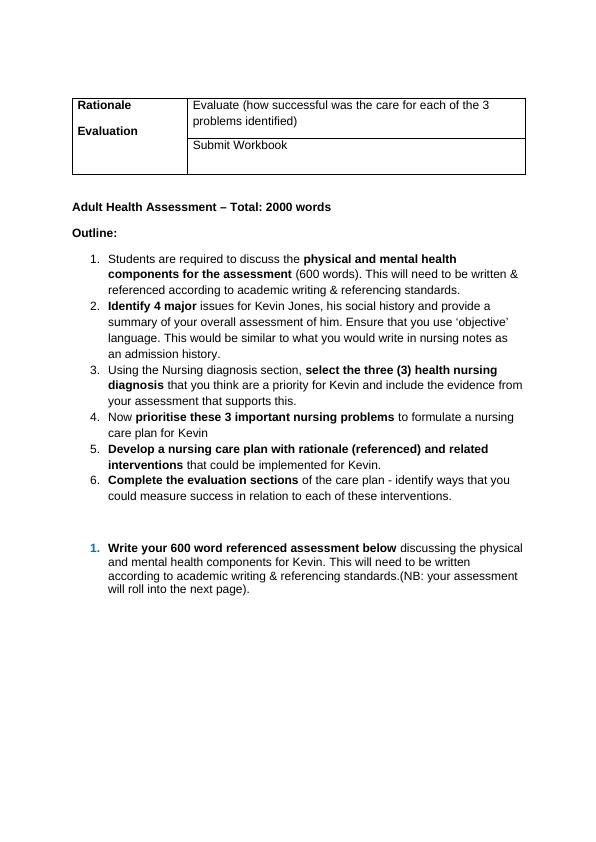
2.The current study takes into consideration the case history of Kevin Joneswho is a 75 year old man receiving health and support care services. Mr. Kevin wasa widower living alone since the last 13 years. In this respect, the past history of thepatient need to be focused upon where the patient Mr. Kevin had suffered frommultiple health issues such as prostate enlargement, hypertension, alcoholism,depression and anxiety. Recently the patient had suffered from cerebrovascularaccident (CVA) which has resulted in right side paralysis. Therefore, during walkingor movement the patient seems to bend over to one side more. Kevin also cannotspeak clearly as his speech often becomes blurred, which disables him to expresshimself clearly, which results in an emotional outburst in the patient. Kevin being an independent man wants to live on his own and not bedependent upon the support and care providers. These results in regularconfrontation of the patient with the care and support service providers where thepatient does not want to follow the advice of the support carers. The patient depictshigh levels of anxiety and wants to return home. Some of the clinical conditions ofthe patient could be described as follows such as presence of chronic cough withchills and fever. The patient also complained of body ache along with loss of
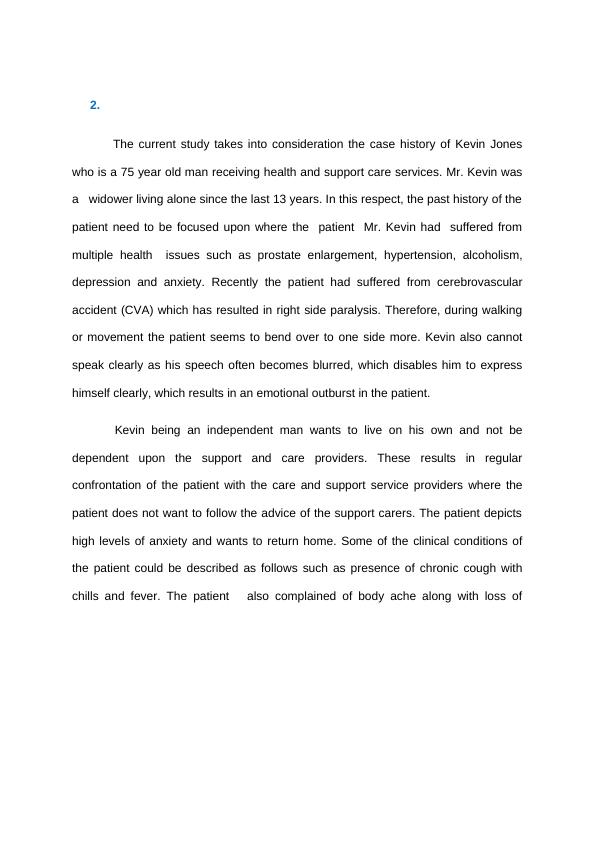
appetite. Some of the vital signs of the patient were noted for designing of aneffective clinical care. The patient depicted a body temperature of 38.3 degreecentigrade which was slightly above normal. The patient recorded a blood pressureof 90/60, a respiratory rate of 24 breaths per min, pulse noted at 90 and the partialpressure of oxygen noted at 93%. The chest x-ray of the patient revealed that thepatient had pneumonia in the lower lobe. Kevin also suffered from swallowingdifficulties, which resulted in the patient suffering from dehydration. The patientseems to be suffering from dehydration which made his skin turgor and mucousmembranes dry (Castellan, Sluga, Spina & Sanson, 2016). The patient haddecreased urine output and increased urine concentration and has elevated levels ofblood urea level. Kevin had erratic and hard bowels and suffered from occasionalurine incontinence. Additionally, antibiotics could be used for the treatment ofpneumonia in the patient such as ceftriaxone and azithromycin etc (Call et al.,2016).Therefore, depending upon the signs and symptoms expressed by the patientthe physical and mental components of care could be designed for the patient. Based upon the cumulative health conditions of the patient, the nursing prioritieswhich could be designed for the patient are- restoring the hydration capacity in the
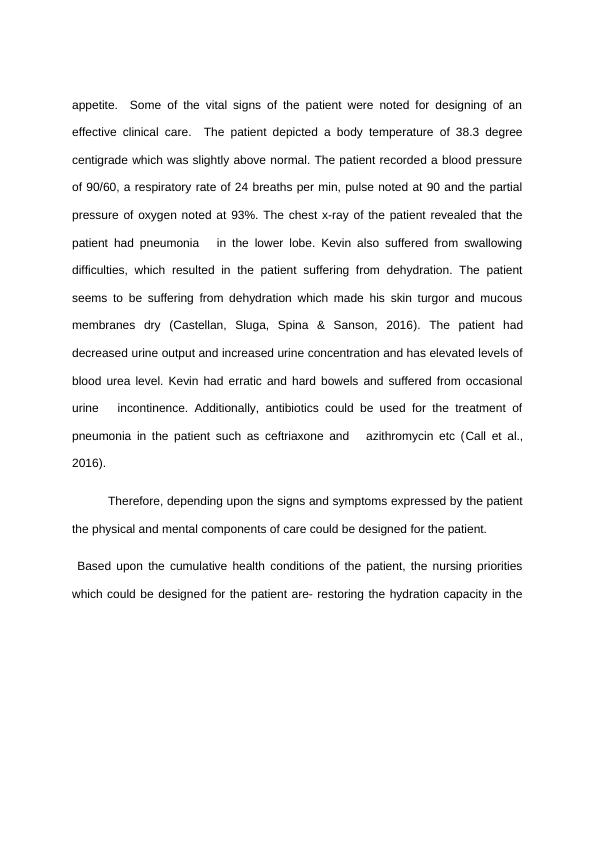
patient and treating of lower lobe pneumonia. As mentioned by Doenges, Moorhouse& Murr (2016), less water intake has been associated with reduced metabolism andless kidney function. In order to track the dehydration the patient needs to be put inan effective hydration therapy. The electrolyte and fluid balance within the patientcould be restored with the help of channel IV therapy. The patient Kevin sufferedfrom pneumonia resulting in coughing in the patient, which could possibly block theairway resulting in swallowing difficulties.
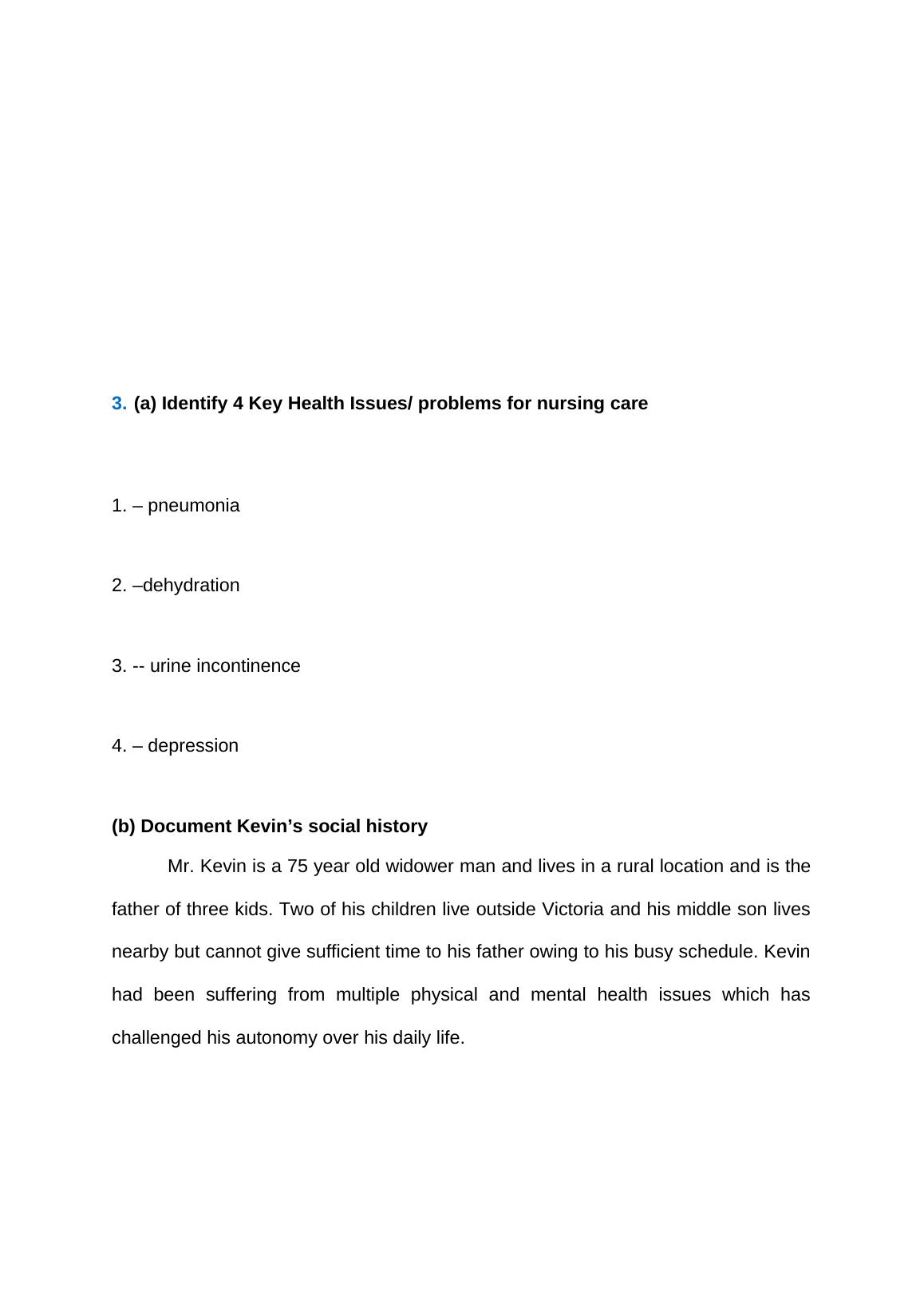
End of preview
Want to access all the pages? Upload your documents or become a member.
Related Documents
Health Assessment & Nursing Care Plan Workbook for NURBN2000lg...
|15
|4629
|193
Health Assessment & Nursing Care Plan Workbook for NURBN2000lg...
|18
|4476
|443
Nursing Case Study Analysis with APA 7th Referencing Stylelg...
|11
|4066
|455
Assessment Task 1: Nursing | Mental State Examination Workbooklg...
|10
|3486
|26
HLT54115 Diploma of Nursinglg...
|9
|2294
|36
Ultrabrief Electroconvulsive Therapy For Manic Episodeslg...
|9
|2725
|16